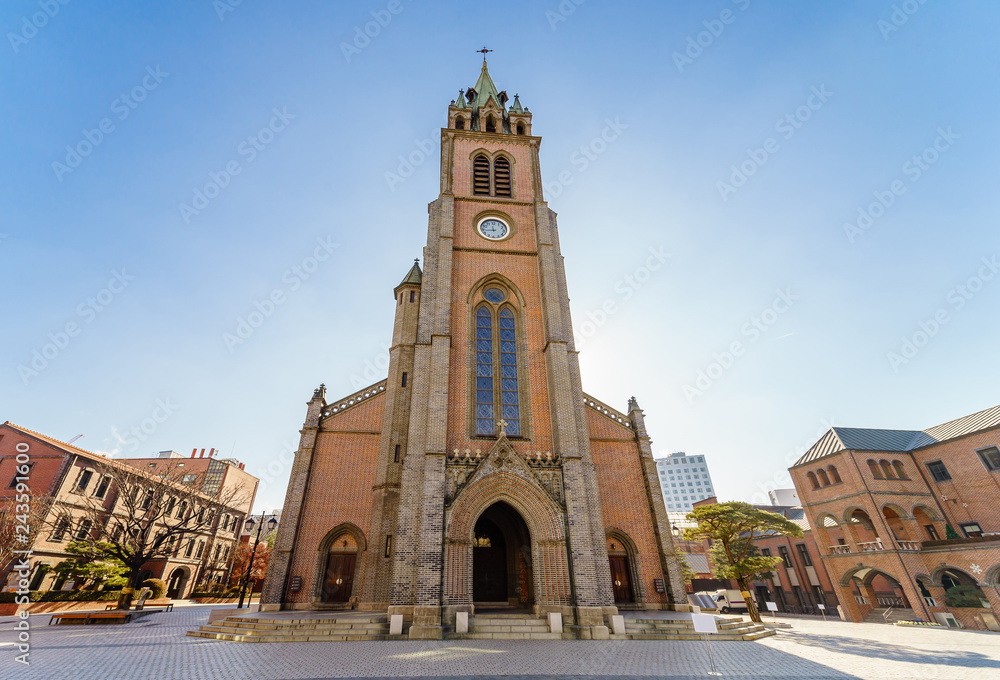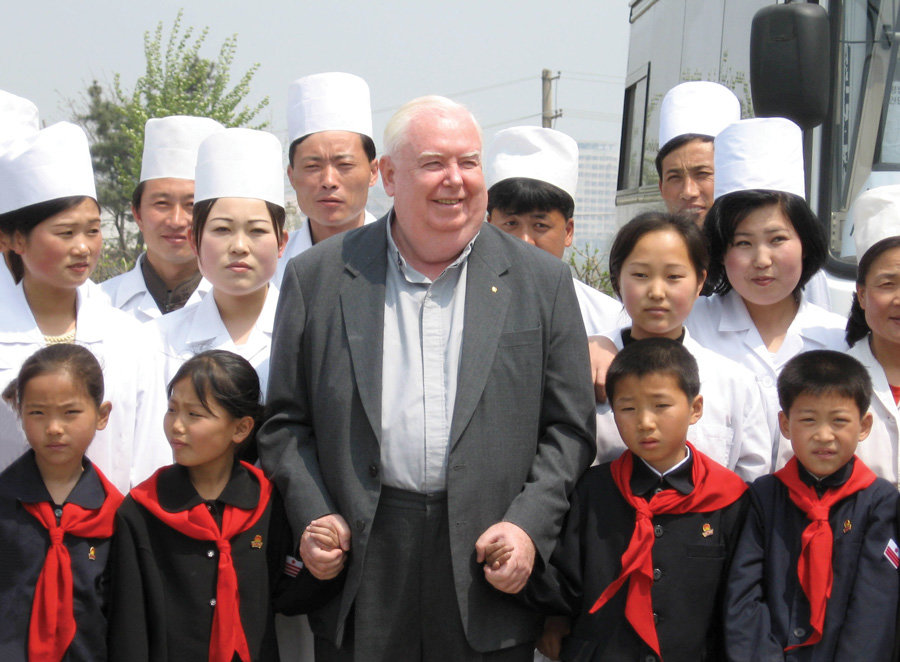
In a bulletin for priests, a member of the Justice and Peace of a diocese writes about finding lost lifestyles and activities.

In a bulletin for priests, a member of the Justice and Peace of a diocese writes about finding lost lifestyles and activities.

The Vice Chairman of the National Reconciliation Committee of Seoul Archdiocese in the Catholic Peace Weekly gives the readers his understanding of the recent meeting in Washington.
On 26, President Yoon Seok-yeol visited the United States, held a summit meeting with President Joe Biden, and announced a joint agreement. The so-called “Washington Declaration” contained three main points. Looking at the composition of the agreement, the first thing that appears is that South Korea fully trusts the US extended deterrence and abides by the Nuclear Non-Proliferation Treaty.
Many argued that South Korea should also develop nuclear weapons as a solution to North Korea's nuclear threat, but the United States put the brakes on it. Nevertheless, in reality, measures to deter North Korea from using nuclear weapons were included in the second and third points of the Washington Summit. South Korea and the U.S. guarantee more in-depth nuclear-related policy decisions in Korea through the establishment of the Vice Ministerial Nuclear Consultative Group (NCG), and regularly deploy US nuclear submarines loaded with nuclear weapons, to the Korean Peninsula.
The latest declaration is evaluated as containing measures for extended deterrence within the framework of the ROK-US alliance while banning South Korea from introducing its own nuclear weapons at a time when North Korea's nuclear technology is improving day by day. Due to recently heightened tensions on the Korean Peninsula, many people have insisted on possessing nuclear weapons, and as a result, such claims have subsided with this announcement, which is fortunate. However, it is worrisome whether the extended deterrence contained in the Washington Declaration will lead to peace on the Korean Peninsula.
In general, peace is often divided into two concepts. A state in which there is simply no war is said to be ‘negative peace’. The Washington Declaration is a plan that can ease nuclear tensions on the Korean Peninsula, but it cannot go beyond the level of passive peace. In contrast, ‘positive peace’ refers to a state in which the causes of conflict are resolved by resolving conflicts in a peaceful way and removing structural and cultural violence. The Washington Declaration is meaningful in that it banned South Korea from developing nuclear weapons and prevented a more dangerous encounter, but it is regrettable as a positive peace concept since it deals only with extended deterrence and no attempt was made in mediating fundamental problems between North and South Korea.
Against such an opinion, one might object, we should only wait for the situation in which the nuclear threat increases. It is argued how well the declaration was made as it discussed the use of nuclear weapons and decided to deploy more weapons with tremendous firepower called strategic assets. Of course, he does not mean tolerating and understanding the heightened nuclear tension.
North Korea's nuclear threat is unacceptable under any circumstances and must be stopped. However, the peace Christians seek is simply not completed with deterrence. Trying to deter the threat of the other country with greater force may be a partly realistic policy, but the church notes that extreme distrust lies at the base. Therefore, extended deterrence alone is not sufficient for the journey of peace. Rather than working for extended deterrence, they say that words and actions to build fundamental trust require greater thought and effort.
When a protruding spring is pressed with force, the length of the spring is reduced, but the force of the spring is condensed that much. On the surface, it seems to have softened, but there is a greater tension there. For true peace on the Korean Peninsula, he hopes we can now think about ways to restore mutual trust as much as the merits and efforts of extended deterrence. Deterrence is not a balance of power, but a balance of fear. Christians cannot be said to be at peace with this.

In
the National Reconciliation and Unity column of the Catholic Peace
Weekly, the principal of a Korean Language school in England titles her article: Begin and Someone Will Help.

The Catholic Peace Weekly reports on the meeting of theologians representing the Asian church and their discussion.
The Theological Committee (OTC) of the Federation of Asian Bishops' Conferences (FABC) held a meeting at the Seoul Archdiocese on the 5th to share theological prospects with professional theological committee members from Korea and other countries under the theme of 'Prospects for the Present and Future of the Church in Asia'.
The meeting was followed by keynote lectures by the Archbishop of Seoul (head of the Theological Committee) and the bishop from Indonesia (head of the Theological Committee) of Indonesia, followed by Q&A and free discussion by the members of the Theological Committee.
The Archbishop addressed various pastoral and theological issues facing the church and society. He mentioned pastoral care and efforts toward social integration as the number of migrant workers and multicultural families continues to increase in Asia. "The church must put more effort into pastoral and spiritual care for migrants” and said: “Amid the ecological crisis, the church in Asia must pay more attention to the cries of the poor in particular.
Above all, he spoke more strongly about the Asian church's response to the negative trends of modern society. “Emerging Christian groups with fundamentalist inclinations are making efforts to infiltrate the Catholic Church, atheistic science and technology are having a negative impact, and many people are puzzled and confused due to relativistic values, secularism, and obsessive attachment to things in society. They are confused, lose their faith, and turn their backs on the church.” At the same time, he raised his voice that the church needs to be more concerned about how to lead to faith in Jesus Christ and salvation through Christ.
The Archbishop said: “The first step in Asian theology is dialogue and proclamation. It is necessary to look at and interpret the work from within.” In addition, he said, “It is necessary to discern the working of the Holy Spirit within the complex reality of the Asian continent, and the reality and mission of the church within Asia.”
The Bishop from Indonesia continued his lecture by introducing commentary on the Synod method in Germany and mission theology according to the situation in Asia introduced at the FABC 50th anniversary assembly held in Bangkok, Thailand last year. “We must rely on the Holy Tradition and the Holy Scriptures,” said the bishop “because these constitute primarily the sacred heritage of the Word of God.” Because the Church's holy Magisterium has the right to interpret in the Holy Spirit the heritage of the Word of God, and to discover and discern God's Presence and the Holy Spirit. “No matter how noble the mission, the egocentric method of mission to baptize people and make them members of the Church is no longer effective. Agape love, unconditional and self-sacrificing love, is needed. The paradigm of missions must be reconstructed with agape-like love that will lead us to the kingdom of God.”
Meanwhile, the Asian Bishops' Conference Theological Committee held the 2023 regular meeting at the Spiritual Center of Myeongdong Cathedral, the seat of the Seoul Archdiocese, from the 1st to the 6th. At this regular meeting held in Seoul, about 20 members, including bishops' committee members and expert theological committee members, participated, and theologians representing bishops' conferences in each country discussed various theological prospects and tasks.
A professor writes about the "Werther-effect" in the Catholic Times— Let us Become One column— Werther Effect refers to the identified rise in suicide rates following well-publicized reports of deaths by suicide of celebrities or other well-known figures in the media.
These are also the contents that entertainment agencies should provide more support for by signing reasonable contracts with their celebrities. The public also needs to understand entertainers as professional artists and show restrained interest rather than calling them public figures and demanding excessive responsibility.
Celebrities themselves need to have the idea that a 'celebrity's life' or 'celebrity role performance' is not everything in their lives. If one's life is completely consumed by being a 'celebrity', later, when a 'celebrity life' that seems like one's everything is not possible, if a realistic life or alternative life to support it is not prepared, severe identity confusion and crisis may occur. Celebrity is a highly variable job, so you should be prepared to switch and move freely at any time. 
In the recent Catholic Peace Weekly a University priest professor gives the readers some help in deepening their spiritual life.

In the Catholic Times a person asked about the concept of truth, goodness and beauty of a seminary professor and below is the answer that was given. I have added unity to the list of three.
The concept of truth, goodness beauty and unity is both a philosophical and a theological concept, and comes from the attributes of God. God is the source of truth, goodness, beauty and unity. Truth, goodness, beauty and unity of this world are only finite concepts that reflect the essence of God. Because God is perfect, God's truth, goodness, beauty and unity are also perfect.
The truth, goodness beauty and unity in human beings can only be understood as analogous concepts resembling the true, goodness, beauty and unity of God. Therefore, human beings are said to be beings resembling God's image, which means analogically resembling God's attributes.
Therefore, the truth, goodness, beauty and unity experienced by human beings allow them to experience God analogically, and the deeper this experience, the higher the intensity of experiencing God.
After all, truth, goodness, beauty and unity are God's gifts to human beings so that they can know and worship God, and when they do it freely, they will become human beings who freely express their personality and take ethical actions.
In that respect, it is important to frequently experience and realize truth, goodness, beauty and unity
Because it will eventually lead humanity to God. Truth is the state of being in accordance with fact or reality. It is the ultimate goal in the search of all knowledge. Goodness is the state of being morally right or virtuous. It is the ultimate goal of all inquiry and action. Beauty is the state of being aesthetically pleasing or attractive the ultimate goal of all creative endeavors. Unity is the state of being integrated. It is the ultimate goal of all.
The transcendentals go back to ancient philosophy and understood as qualities that exist beyond the physical world and essential to human understanding and existence.
In Christian philosophy, the concept of the transcendental was developed by the Scholastic theologians, such as Thomas Aquinas in the 13th century. Aquinas taught that the transcendentals are attributes of God and are therefore inherently good. He argued that these qualities can be found in all things because they reflect God's goodness, truth, beauty, and unity.
However, today when we go to search on the internet for the transcendentals often we get three: the true, the good and the beautiful unity is missing. Our culture is not too interested in unity as we can see in our religions, politics, culture, race, and daily life. Materialism, our personal worldview, the value we give to things takes precedence over the dignity of the human being and the common good. What is useful is of more value than truth and the good.
The fundamental message of Sacred Scripture proclaims that the human person is a creature of God and sees in his being the image of God the element that characterizes and distinguishes him: "God created man in his own image, in the image of God he created him; male and female he created them" (Gen 1:27). God places the human creature at the center and summit of the created order. Man (in Hebrew, "adam") is formed from the earth ("adamah") and God blows into his nostrils the breath of life (cf. Gen
2:7). Therefore, "being in the image of God the human individual
possesses the dignity of a person, who is not just something, but
someone. He is capable of self-knowledge, of self-possession and of
freely giving himself and entering into communion with other persons.
Further, he is called by grace to a covenant with his Creator, to offer
him a response of faith and love that no other creature can give in his
stead." (Compendium of the Social Doctrine of the Church #108)